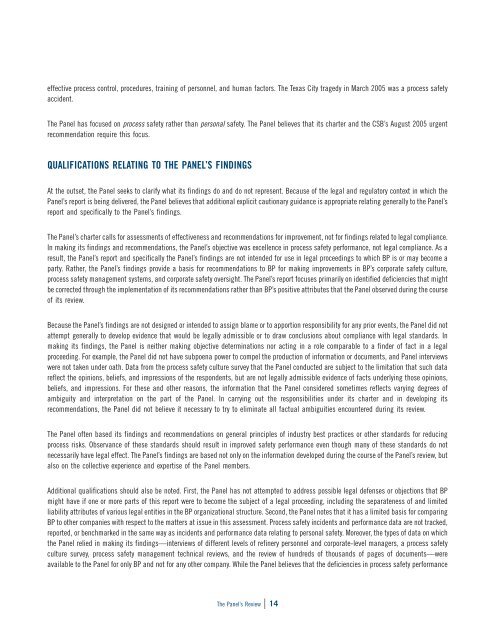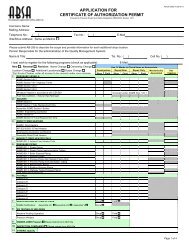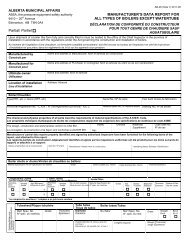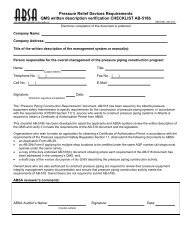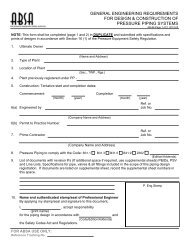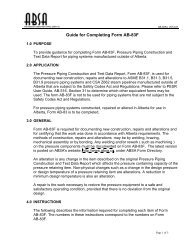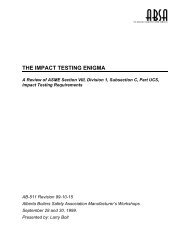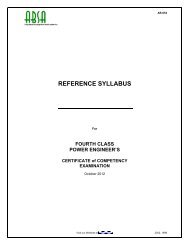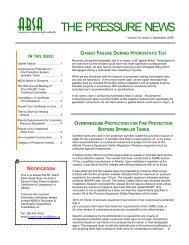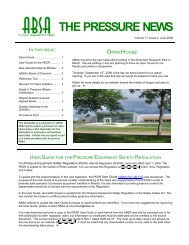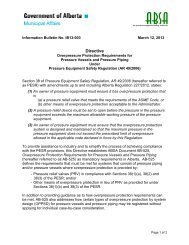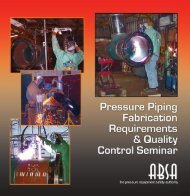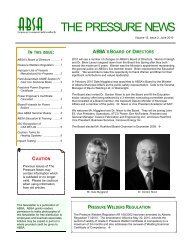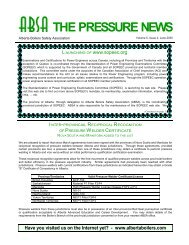The Baker Panel Report - ABSA
The Baker Panel Report - ABSA
The Baker Panel Report - ABSA
You also want an ePaper? Increase the reach of your titles
YUMPU automatically turns print PDFs into web optimized ePapers that Google loves.
effective process control, procedures, training of personnel, and human factors. <strong>The</strong> Texas City tragedy in March 2005 was a process safetyaccident.<strong>The</strong> <strong>Panel</strong> has focused on process safety rather than personal safety. <strong>The</strong> <strong>Panel</strong> believes that its charter and the CSB’s August 2005 urgentrecommendation require this focus.QUALIFICATIONS RELATING TO THE PANEL’S FINDINGSAt the outset, the <strong>Panel</strong> seeks to clarify what its findings do and do not represent. Because of the legal and regulatory context in which the<strong>Panel</strong>’s report is being delivered, the <strong>Panel</strong> believes that additional explicit cautionary guidance is appropriate relating generally to the <strong>Panel</strong>’sreport and specifically to the <strong>Panel</strong>’s findings.<strong>The</strong> <strong>Panel</strong>’s charter calls for assessments of effectiveness and recommendations for improvement, not for findings related to legal compliance.In making its findings and recommendations, the <strong>Panel</strong>’s objective was excellence in process safety performance, not legal compliance. As aresult, the <strong>Panel</strong>’s report and specifically the <strong>Panel</strong>’s findings are not intended for use in legal proceedings to which BP is or may become aparty. Rather, the <strong>Panel</strong>’s findings provide a basis for recommendations to BP for making improvements in BP’s corporate safety culture,process safety management systems, and corporate safety oversight. <strong>The</strong> <strong>Panel</strong>’s report focuses primarily on identified deficiencies that mightbe corrected through the implementation of its recommendations rather than BP’s positive attributes that the <strong>Panel</strong> observed during the courseof its review.Because the <strong>Panel</strong>’s findings are not designed or intended to assign blame or to apportion responsibility for any prior events, the <strong>Panel</strong> did notattempt generally to develop evidence that would be legally admissible or to draw conclusions about compliance with legal standards. Inmaking its findings, the <strong>Panel</strong> is neither making objective determinations nor acting in a role comparable to a finder of fact in a legalproceeding. For example, the <strong>Panel</strong> did not have subpoena power to compel the production of information or documents, and <strong>Panel</strong> interviewswere not taken under oath. Data from the process safety culture survey that the <strong>Panel</strong> conducted are subject to the limitation that such datareflect the opinions, beliefs, and impressions of the respondents, but are not legally admissible evidence of facts underlying those opinions,beliefs, and impressions. For these and other reasons, the information that the <strong>Panel</strong> considered sometimes reflects varying degrees ofambiguity and interpretation on the part of the <strong>Panel</strong>. In carrying out the responsibilities under its charter and in developing itsrecommendations, the <strong>Panel</strong> did not believe it necessary to try to eliminate all factual ambiguities encountered during its review.<strong>The</strong> <strong>Panel</strong> often based its findings and recommendations on general principles of industry best practices or other standards for reducingprocess risks. Observance of these standards should result in improved safety performance even though many of these standards do notnecessarily have legal effect. <strong>The</strong> <strong>Panel</strong>’s findings are based not only on the information developed during the course of the <strong>Panel</strong>’s review, butalso on the collective experience and expertise of the <strong>Panel</strong> members.Additional qualifications should also be noted. First, the <strong>Panel</strong> has not attempted to address possible legal defenses or objections that BPmight have if one or more parts of this report were to become the subject of a legal proceeding, including the separateness of and limitedliability attributes of various legal entities in the BP organizational structure. Second, the <strong>Panel</strong> notes that it has a limited basis for comparingBP to other companies with respect to the matters at issue in this assessment. Process safety incidents and performance data are not tracked,reported, or benchmarked in the same way as incidents and performance data relating to personal safety. Moreover, the types of data on whichthe <strong>Panel</strong> relied in making its findings—interviews of different levels of refinery personnel and corporate-level managers, a process safetyculture survey, process safety management technical reviews, and the review of hundreds of thousands of pages of documents—wereavailable to the <strong>Panel</strong> for only BP and not for any other company. While the <strong>Panel</strong> believes that the deficiencies in process safety performance<strong>The</strong> <strong>Panel</strong>’s Review C 14


